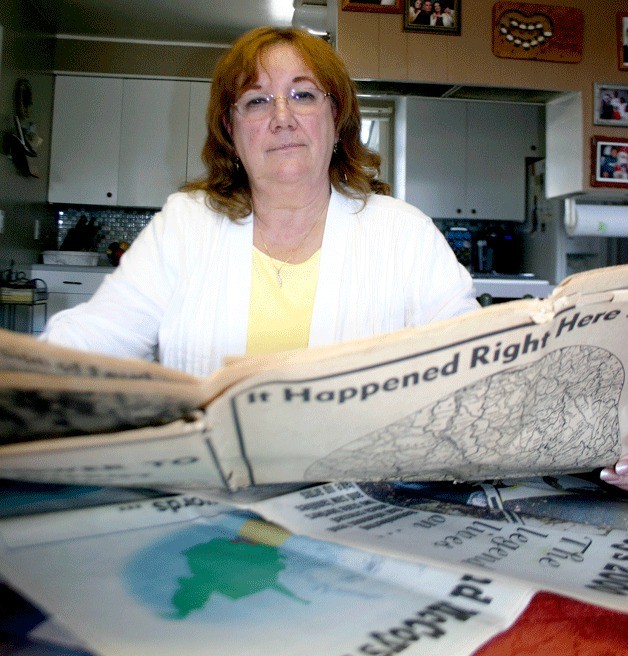It’s an age-old feud immortalized by television, a tale of evil and devastation, and an Oak Harbor woman is related to one of the families involved.
Nancy Liekhus is a descendent of the McCoy family, the legendary family that feuded with the Hatfields in the late 1800s in Kentucky.
Growing up in Pinsonfork, Ky., Liekhus said her family never spoke of the feud. It wasn’t until 1981 that she learned of her heritage and delved into its history.
At her Oak Harbor home, Liekhus paged through a heap of yellowed newspapers commemorating the events of the feud. Old black and white family photos of the Hatfields and McCoys showed stoic men with guns and young boys holding pistols.
“If you go back now, it’s just country people,” Liekhus said. “When we grew up, we never knew about wars or fights and stuff.”
Liekhus is named after her great-grandmother, Nancy McCoy, who died before Liekhus was born. Nancy McCoy married Johnse Hatfield at a young age. Johnse was the youngest son of “Devil” Anse Hatfield, leader of the Hatfield family at the time.
Later, Nancy McCoy divorced abusive Johnse Hatfield and married Frank Phillips, known as the “bane of the Hatfields,” Liekhus said. He was sent by the governor of Kentucky to find out why the Hatfields and McCoys were killing each other and died of a gunshot wound a few years later. Nancy McCoy also lost her father and a brother to the feud.
“I think she’s pretty,” Liekhus said, pointing to a black and white portrait of her grandmother in a newspaper. “There’s something rough but I think she’s pretty.”
“They looked like they had a rough life. It was hard living back then,” Liekhus said. “To survive, they had to do what they had to do.”
From tragedy to celebrations
Liekhus viewed the recent miniseries the History Channel created about the feud. She said Devil Anse Hatfield was portrayed as “a much nicer person than he actually was. The McCoys, I think, kind of got a bum deal out of it.”
In the 1860s, Devil Anse Hatfield, a South sympathizer, had formed a guerrilla band to protect his property from the Union. The feud began in 1865 when Harmon McCoy, a Union veteran, was murdered.
Through her research, Liekhus explored another key instigator of the feud. Due to the poverty of the area, families couldn’t feed their pigs over the winter so let them roam free in the woods. In the spring, they would collect the pigs, including sows that had given birth. Devil Anse Hatfield “happened to pick up (Randall McCoy’s) pig before he got it,” Liekhus explained. Randall McCoy was head of the McCoy family at the time.
“It started with words, and then it started with violence,” Liekhus said.
During the feud, three boys were tied to a tree and shot, there was one lynching and Randolph McCoy lost his family when the Hatfields burned his home.
“They said he went crazy. But I don’t think he went crazy; he was trying to get over the shock of losing his family in that way,” Liekhus said.
Eventually, the government had to step in and stop the feud “because it got so bad they thought it was going to be a civil war,” Liekhus said.
Now, celebrations mark the events of the feud and the tragedy has been commercialized. Among other souvenirs, lamps sporting the facades of Devil Anse Hatfield and Randall McCoy are available for purchase.
“I can’t stand them things! They’re so ugly!” Liekhus said, laughing.
Times change
Despite growing up in an area wrought with violence less than 100 years earlier, Liekhus’ childhood was peaceful and family-oriented. She grew up on Pond Creek, near Devil Anse Hatfield’s burial site. During her childhood, the area was all hills and old coal mines, she said. Liekhus grew up in a three-bedroom house with seven siblings. Her dad worked in the mines with other descendants of the Hatfields and McCoys.
Despite living in a poor area, Liekhus said she was proud of her father, Ray Phillips, who supported the family well and was named coal miner of the year.
“And the one thing I think I remember the most is we never had fear,” Liekhus said. They didn’t worry about locking doors or taking the keys out of the car. The community got together to can food and shuck corn.
Her family raised pigs, “and our uncle lived across the holler and he had cows. And everybody helped each other and got a share of the goodies, as we called them,” Liekhus said.
“Especially us girls were afraid to date because we were related to everybody,” Liekhus laughed.
Liekhus moved to Oak Harbor in the late 1970s and has made a few trips back to Kentucky over the years.
“Going back there is like going back in time — the hairdos, the clothes,” Liekhus said, mentioning beehive hairdos and oversized earrings. However, the area has undergone commercialization since her childhood, with a number of new shops lining Tug River. But most importantly, every time she returns to Kentucky, the people make her feel at home.
“How well everybody gets along, it’s amazing,” Liekhus said. “You don’t have to be related to be family.”



